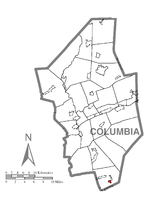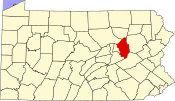Centralia, Pennsylvania
|
Centralia, Pennsylvania Bull's Head |
|
|---|---|
| Borough | |

Centralia as seen from South Street, July 2010
|
|
 Map showing Centralia in Columbia County |
|
 Map showing Columbia County in Pennsylvania |
|
| Location of Centralia in Pennsylvania | |
| Coordinates: 40°48′12″N 76°20′30″W / 40.80333°N 76.34167°WCoordinates: 40°48′12″N 76°20′30″W / 40.80333°N 76.34167°W | |
| Country | United States |
| State | Pennsylvania |
| County | Columbia |
| Settled | 1841 (as Bull's Head) |
| Incorporated | 1866 (Borough of Centralia) |
| Founded by | Jonathan Faust |
| Government | |
| • Mayor a | Carl Womer (d.2014) |
| Area | |
| • Total | 0.24 sq mi (0.6 km2) |
| • Land | 0.24 sq mi (0.6 km2) |
| • Water | 0 sq mi (0 km2) 0% |
| Elevation | 1,467 ft (447 m) |
| Population (2010) | |
| • Total | 10 |
| • Estimate (2013) | 7 |
| • Density | 42/sq mi (16/km2) |
| Time zone | Eastern (EST) (UTC-5) |
| • Summer (DST) | EDT (UTC-4) |
| ZIP code | 17927 (discontinued 2002) 17921 (Ashland 2002-present) |
| Area code | 570 |
|
|
Centralia is a borough and a near-ghost town in Columbia County, Pennsylvania, United States. Its population has dwindled from more than 1,000 residents in 1980 to only 10 in 2010. This is the result of the coal mine fire, which has been burning beneath the borough since 1962. Centralia, which is part of the Bloomsburg–Berwick metropolitan area, is the least-populated municipality in Pennsylvania. It is completely surrounded by Conyngham Township.
All real estate in the borough was claimed under eminent domain in 1992 and therein condemned by the Commonwealth of Pennsylvania. Centralia's ZIP code was discontinued by the Postal Service in 2002. State and local officials reached an agreement with the seven remaining residents on October 29, 2013, allowing them to live out their lives there, after which the rights to their houses will be taken through eminent domain.
Many of the Native American tribes in what is now Columbia County sold the land that makes up Centralia to colonial agents in 1749 for the sum of five hundred pounds. In 1770, during the construction of the Reading Road, which stretched from Reading to Fort Augusta (present-day Sunbury), settlers surveyed and explored the land. A large portion of the Reading Road was developed later as Route 61, the main highway east into and south out of Centralia.
In 1793, Robert Morris, a hero of the Revolutionary War and a signatory of the Declaration of Independence, acquired a third of Centralia's valley land. When he declared bankruptcy in 1798, the land was surrendered to the Bank of the United States. A French sea captain named Stephen Girard purchased Morris' lands for $30,000, including 68 tracts east of Morris.' He had learned that there was anthracite coal in the region.
...
Wikipedia

